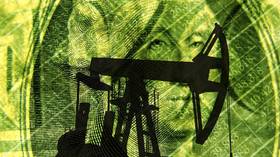Oil at $100 per barrel? Attack on Saudi refineries could shake oil market further

The drone strike on key Saudi oil facilities could stoke already-flaring tensions in the Middle East, driving crude prices higher amid growing fears of supply shortages, market and industry experts believe.
The devastating attack on major Saudi oil refineries at Abqaiq and Khurais slashed the kingdom’s output by 50 percent and knocked out more than five percent of global daily production. The consequences of the strikes led to uncertainty in the oil market as it’s unclear when the oil giant can restore operations to normal.
Analysts warn that it will take longer than had initially been thought to reopen the refineries, which were shut down after the strikes triggered massive fires there. Andy Lipow, president of Lipow Oil Associates, believes several months will pass before the entire plants are back to normal, but production may actually be resumed earlier than that.
Also on rt.com Oil prices skyrocket 20% after attacks on Saudi plants disrupt global supplyWhile Saudi Aramco facilities are offline, concerns of supply shortages are only rising. Crude prices are poised to soar, but by how much has experts divided.
“I’m anticipating that oil prices in the near term are going to rise an additional $3 to $5 a barrel, due to the increased amount of geopolitical tensions that we’ve seen since this attack occurred,” Lipow told RT.
If the tensions grew to the point when the Strait of Hormuz were actually shut, then the oil prices could rise to $100 a barrel.
However, not everyone agrees that squeezed output can push crude prices to $100. Market analyst David Madden of CMC markets argues that such a surge “is highly unlikely,” but still expects oil futures to trade higher.
“Maybe for Brent crude oil back up towards $72 or $75 [per barrel], perhaps, or West Texas Intermediate (WTI) up to between $63-65 [per barrel] in the next few weeks is likely,” Madden said in a phone interview.
Saudi Arabia is the de-facto leader of OPEC, and other members of the oil cartel can offset the kingdom’s shortages if they come to an agreement on it with allied states, according to the analysts. Kuwait, the UAE and non-member Russia can use their spare capacities for it.
However, it does not mean that OPEC and other major oil exporters will roll back the output cuts they agreed to last year to boost the market, according to the CEO of the Russian Direct Investment Fund (RDIF), Kirill Dmitriev.
“Geopolitical uncertainty remains in place but at this stage it is premature to make any conclusions about the OPEC+ deal,” said Dmitriev. “This deal is one of the key factors behind the stability on the oil markets.”
According to Pye Ian, an American economic analyst and private equity executive, there’s plenty of oil from other producers to make up for the expected Saudi shortage, but the question of whether they’ll be provisioned is more of a political consideration, rather than an economic or technical one, “As it has been for decades.”
The oil price is a key geopolitical tool, Ian told RT. “Oil’s price spikes – whether resulting from military or political conflicts – aren’t necessarily due to the laws of supply and demand, despite claims otherwise by industry sources, bank analysts, politicians or the financial press. Just as oil’s price drops aren’t either.”
Entities relying on Saudi imports can start seeking alternative supply sources, Abdessamad al-Azani, associate professor at the business and economics department of Qatar University, told Ria Novosti. In this way the US may become the main beneficiary of Saudi oil troubles.
“The US can become such an alternative, [US President Donald] Trump made it clear when he wrote that the shipments of oil from the Middle East are not necessary,” al-Azani said.
For more stories on economy & finance visit RT's business section














